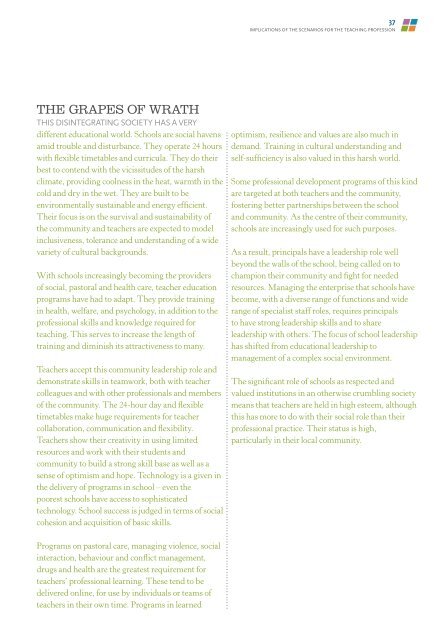Teaching for uncertain futures - Neville Freeman Agency
Teaching for uncertain futures - Neville Freeman Agency
Teaching for uncertain futures - Neville Freeman Agency
You also want an ePaper? Increase the reach of your titles
YUMPU automatically turns print PDFs into web optimized ePapers that Google loves.
37implications of the scenarios <strong>for</strong> the teaching professionThe Grapes of WrathThis disintegrating society has a verydifferent educational world. Schools are social havensamid trouble and disturbance. They operate 24 hourswith flexible timetables and curricula. They do theirbest to contend with the vicissitudes of the harshclimate, providing coolness in the heat, warmth in thecold and dry in the wet. They are built to beenvironmentally sustainable and energy efficient.Their focus is on the survival and sustainability ofthe community and teachers are expected to modelinclusiveness, tolerance and understanding of a widevariety of cultural backgrounds.With schools increasingly becoming the providersof social, pastoral and health care, teacher educationprograms have had to adapt. They provide trainingin health, welfare, and psychology, in addition to theprofessional skills and knowledge required <strong>for</strong>teaching. This serves to increase the length oftraining and diminish its attractiveness to many.Teachers accept this community leadership role anddemonstrate skills in teamwork, both with teachercolleagues and with other professionals and membersof the community. The 24-hour day and flexibletimetables make huge requirements <strong>for</strong> teachercollaboration, communication and flexibility.Teachers show their creativity in using limitedresources and work with their students andcommunity to build a strong skill base as well as asense of optimism and hope. Technology is a given inthe delivery of programs in school – even thepoorest schools have access to sophisticatedtechnology. School success is judged in terms of socialcohesion and acquisition of basic skills.optimism, resilience and values are also much indemand. Training in cultural understanding andself-sufficiency is also valued in this harsh world.Some professional development programs of this kindare targeted at both teachers and the community,fostering better partnerships between the schooland community. As the centre of their community,schools are increasingly used <strong>for</strong> such purposes.As a result, principals have a leadership role wellbeyond the walls of the school, being called on tochampion their community and fight <strong>for</strong> neededresources. Managing the enterprise that schools havebecome, with a diverse range of functions and widerange of specialist staff roles, requires principalsto have strong leadership skills and to shareleadership with others. The focus of school leadershiphas shifted from educational leadership tomanagement of a complex social environment.The significant role of schools as respected andvalued institutions in an otherwise crumbling societymeans that teachers are held in high esteem, althoughthis has more to do with their social role than theirprofessional practice. Their status is high,particularly in their local community.Programs on pastoral care, managing violence, socialinteraction, behaviour and conflict management,drugs and health are the greatest requirement <strong>for</strong>teachers’ professional learning. These tend to bedelivered online, <strong>for</strong> use by individuals or teams ofteachers in their own time. Programs in learned



